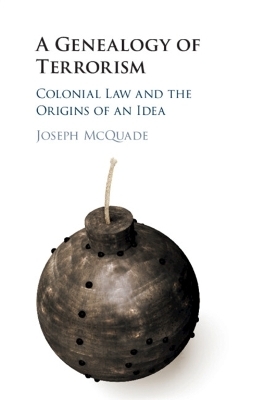
A Genealogy of Terrorism
Colonial Law and the Origins of an Idea
Seiten
2022
Cambridge University Press (Verlag)
978-1-108-81632-8 (ISBN)
Cambridge University Press (Verlag)
978-1-108-81632-8 (ISBN)
Using India as a case study, Joseph McQuade traces the genealogy of the political and legal category of terrorism. He demonstrates how the modern concept of terrorism was shaped by colonial emergency laws dating back into the nineteenth and early twentieth centuries.
Using India as a case study, Joseph McQuade demonstrates how the modern concept of terrorism was shaped by colonial emergency laws dating back into the nineteenth and early twentieth centuries. Beginning with the 'thugs', 'pirates', and 'fanatics' of the nineteenth century, McQuade traces the emerging and novel legal category of 'the terrorist' in early twentieth-century colonial law, ending with an examination of the first international law to target global terrorism in the 1930s. Drawing on a wide range of archival research and a detailed empirical study of evolving emergency laws in British India, he argues that the idea of terrorism emerged as a deliberate strategy by officials seeking to depoliticize the actions of anti-colonial revolutionaries, and that many of the ideas embedded in this colonial legislation continue to shape contemporary understandings of terrorism today.
Using India as a case study, Joseph McQuade demonstrates how the modern concept of terrorism was shaped by colonial emergency laws dating back into the nineteenth and early twentieth centuries. Beginning with the 'thugs', 'pirates', and 'fanatics' of the nineteenth century, McQuade traces the emerging and novel legal category of 'the terrorist' in early twentieth-century colonial law, ending with an examination of the first international law to target global terrorism in the 1930s. Drawing on a wide range of archival research and a detailed empirical study of evolving emergency laws in British India, he argues that the idea of terrorism emerged as a deliberate strategy by officials seeking to depoliticize the actions of anti-colonial revolutionaries, and that many of the ideas embedded in this colonial legislation continue to shape contemporary understandings of terrorism today.
Joseph McQuade is the RCL Postdoctoral Fellow at the University of Toronto's Asian Institute.
Introduction. The colonial prose of counterterrorism; 1. Ethereal assassins: colonial law and 'hereditary crime' in the nineteenth century; 2. 'The magical lore of Bengal': surveillance, swadeshi, and propaganda by bomb, 1890s to 1913; 3. 'The eye of government is on them': anti-colonialism and emergency during the First World War; 4. Indefinite emergency: revolutionary politics and 'terrorism' in interwar India; 5. Terrorism as a 'world crime': the British Empire, international law, and the invention of global terrorism; Conclusion. Empire, law, and terrorism in the twenty-first century.
| Erscheinungsdatum | 25.08.2022 |
|---|---|
| Zusatzinfo | Worked examples or Exercises |
| Verlagsort | Cambridge |
| Sprache | englisch |
| Maße | 152 x 229 mm |
| Gewicht | 397 g |
| Themenwelt | Geisteswissenschaften ► Geschichte ► Regional- / Ländergeschichte |
| Geschichte ► Teilgebiete der Geschichte ► Militärgeschichte | |
| Recht / Steuern ► Rechtsgeschichte | |
| Sozialwissenschaften ► Politik / Verwaltung ► Europäische / Internationale Politik | |
| ISBN-10 | 1-108-81632-0 / 1108816320 |
| ISBN-13 | 978-1-108-81632-8 / 9781108816328 |
| Zustand | Neuware |
| Haben Sie eine Frage zum Produkt? |
Mehr entdecken
aus dem Bereich
aus dem Bereich
neueste Manipulationstechniken als Waffengattung der NATO
Buch | Softcover (2023)
Westend (Verlag)
CHF 33,55
Deutschlands Schwäche in der Zeitenwende
Buch | Softcover (2023)
C.H.Beck (Verlag)
CHF 25,20


